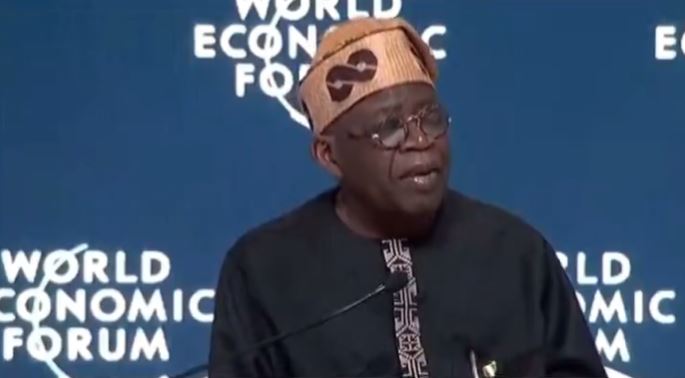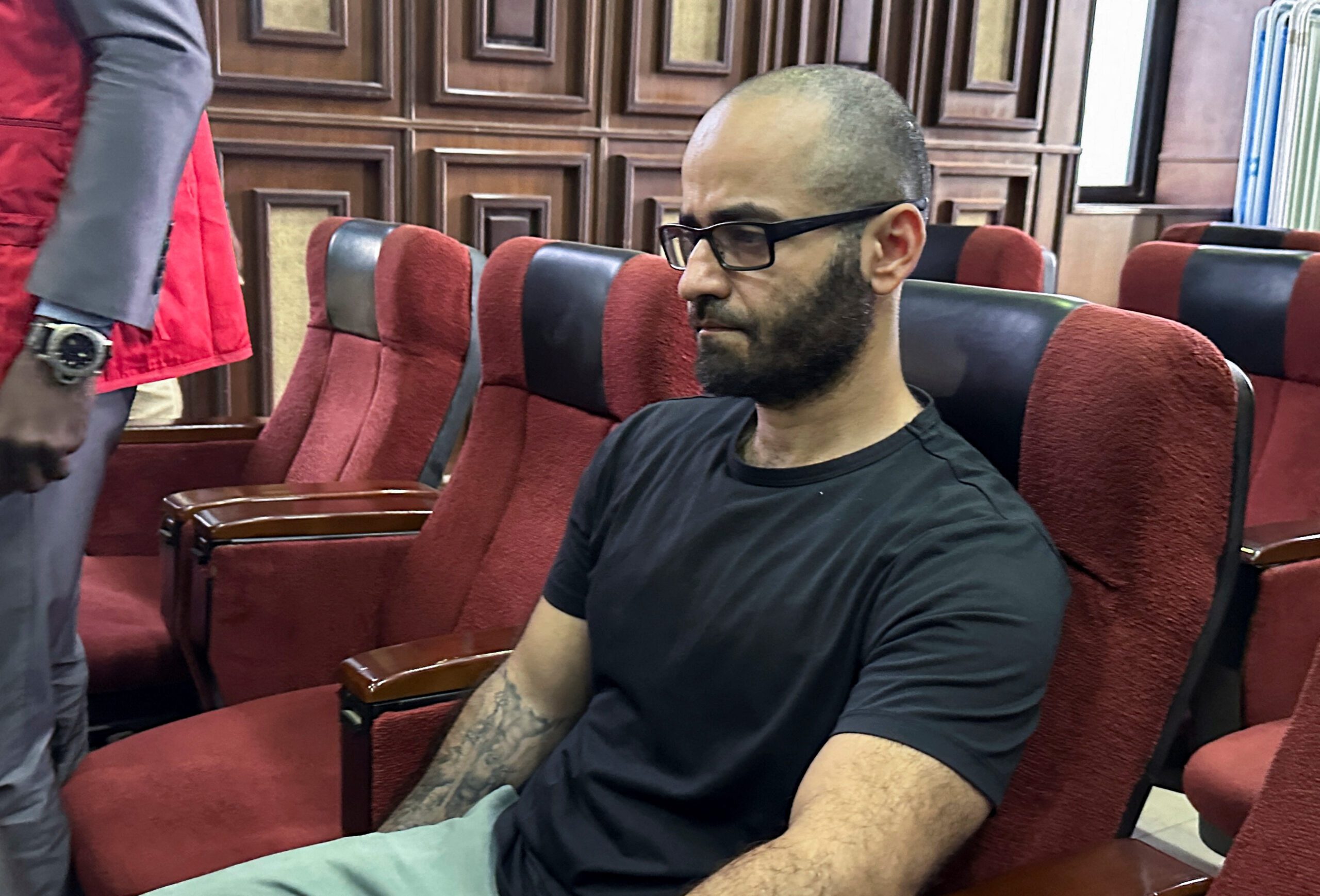News
Fuel subsidy removal necessary to avert financial crisis – Tinubu

President Bola Tinubu has said that his administration’s removal of the fuel subsidy was in the best interest of Nigeria, saying it was necessary not to plunge the country into bankruptcy.
He stressed the country’s belief in economic collaboration and inclusiveness among other nations to drive stability on the global stage.
Tinubu stated these during a panel session at the ongoing World Economic Forum in Riyadh, Saudi Arabia, on Sunday, which focuses on Global Collaboration, Growth, and Energy for Development.
He said, “For Nigeria, we are immensely consistent with belief that the economic collaboration and inclusiveness are necessary to engender stability in the rest of the world.
“Concerning the question of the subsidy removal, there is no doubt that it was a necessary action for my country not to go bankrupt, to reset the economy and pathway to growth.”
Tinubu, on his inauguration on May 29, 2023, declared to the citizens his resolve to stop the payment of the fuel subsidy, saying “subsidy is gone.”
The subsidy, which the Federal Government used to help the citizens ameliorate the payment for fuel purchases at higher prices, later became a sort of nightmare for the populace as it had partly contributed to the exorbitant prices of commodities in the market, especially food items, transportation costs, among others.
This sparked tense reactions and calls from Nigerians and concerned stakeholders like the Organised Labour Union as well as opposition figures and the international community on the dire consequences that had affected the standard of living of the populace.
However, the President had admitted in his New Year message on January 1, 2024, that even though it was a tough decision to pronounce the removal of the fuel subsidy, its payments by the FG were an “unsustainable financial burden” on the country.
“It is going to be difficult, but the hallmark of leadership is taking difficult decisions at the time it ought to be taken decisively. That was necessary for the country. Yes, there will be blowback, there is an expectation that the difficulty in it will be felt by a greater number of the people, but once I believe it is their interest that is the focus of the government, it is easier to manage and explain the difficulties.
“Along the line, there is a parallel arrangement to really cushion the effects of the subsidy removal on the vulnerable population of the country. We share the pain across the board, and we cannot but include those who are vulnerable.
“Luckily, we have a very vibrant youthful population interested in discoveries by themselves, and they are highly ready for technology, good education committed to growth. We are able to manage that and partition the economic drawback and the fallout of subsidy removal,” he said.
Tinubu equally noted that the fuel subsidy removal brought about accountability, transparency, and physical discipline for the country.
Speaking on the exchange rate unification and the swinging rate of the Naira against other global currencies like the United States dollar, Tinubu said, “The currency management was necessary equally to remove the artificial elements of value in our currency. Let our local currency find its level and compete with the rest of the world currency and remove arbitrage, corruption, and opaqueness.
“That we did at the same time. That is a two-engine problem in a very template situation for the government, but we are able to manage that turbulence because we are prepared for inclusivity in governance and rapid communication with the public to really see what is necessary and what you must do.”
News
Dapo Abiodun: After five phenomenal years, three glorious years beckon…


By Kayode Akinmade
He came into office amid ceaseless assaults by a violent Establishment. He had no handover notes. But he had an agenda, a steely resolve, and a burning passion to transform the Ogun environment. Today, five years on, even the most cynical observer would admit that the Iperu-born prince and boardroom genius has turned the Gateway State around, infused a climate of excitement into governance and state management, building joy and hope for the future in the populace. This is remarkable in a country long hobbled by politicians’ failed promises.
Perhaps the most salient aspect of Abioduns’ leadership is the climate of peace actively fostered in the state. Peace pervades the length and breadth of the land because the Sheriff in charge is determined to leave a lasting legacy of life-changing projects behind, and would not be drawn into political brawls even when a predecessor, taking advantage of the calm in the land, tours the senatorial districts, staging hate campaigns. That is not by accident. Abiodun is a transformational leader, and transformational leaders, as the leadership expert and presidential biographer James MacGregor Burns tells us, are those who, in company with their followers, advance to a higher level of morals and motivation. The fact cannot be disputed that through the strength of their vision and personality, transformational leaders inspire their followers to a higher level of intellectual stimulation, and hence social change.
Against this backdrop, Ogun being rated as Nigeria’s most peaceful state comes as no surprise. People tend to copy what they see their leaders doing. Ogun people have not forgotten the highly instructive incident that took place shortly after their Governor assumed office. Some pastors of the RCCG had been kidnapped while he was away in Abuja on official business. Given the viciousness of the outlaws, hope was low regarding their rescue. But the Governor simply requested for and obtained helicopters for aerial surveillance of the target area, and all the clergymen were rescued unhurt. Jubilations erupted in many places…
The Abiodun administration initiated the Security Trust Fund, rallying stakeholders to contribute to the fight against crime. It procured over 100 patrol vans, motorcycles, walkie-talkies, and other security equipment to enhance the operational efficiency of security agencies. Then came an additional 25 patrol vans and surveillance drones in collaboration with Lagos and Oyo States to monitor activities along the Lagos-Ibadan Expressway. And then came Amotekun, deployed at flashpoints…
Because Ogun is calm, the strides in agriculture, the mainstay of the Nigerian economic, have been simply phenomenal. Through the Anchor Borrowers Programme, the Abiodun administration has revolutionized youth involvement in agriculture. It created the Ogun State Investment Promotion Agency (OGUNIPA) and the Ogun State Business Executive Council (OGUNBEC) to make the Gateway State the destination of choice for investors. The administration empowered thousands of farmers through training, capacity building and provision of farming inputs, and Ogun is now a leading producer of rice, maize, and cassava in Nigeria. The story cannot be different with Abiodun’s heavy investment in the development of agricultural infrastructure, including irrigation systems, farm roads, and storage facilities.
When a government fosters partnerships with private sector players, attracting investments and driving growth; implements initiatives to improve livestock production, including the distribution of breeding stock, veterinary support, and establishment of grazing reserves, the result is bound to be refreshing.
The Abiodun administration has strengthened extension services, providing farmers with access to expert advice, technology, and best practices to improve their productivity and efficiency. It has supported farmers to produce high-quality products and linked them to markets and processors. It has created thousands of jobs in the agricultural sector, having developed and implemented policies like the Ogun State Agricultural Policy and the Ogun State Livestock Development Policy. There is no space to detail the government’s empowerment of farmers with solar pump machines; the N50 million Ijebu Development Initiative for Poverty Reduction (Eriwe) meant to develop the fish subsector in the state; the empowerment of over 40,000 agripreneurs in cassava cultivation, or the distribution of motorcycles to extension agents to reach farmers in remote areas across the state.
In education, the abolition of all levies spiked enrolment in primary schools, even as the government adopted a school per ward for development as a model school. The promotion of teachers and equipment of schools and higher institutions and revolution of the transcript processing system has restored dignity to Ogun schools. And among the giant strides of the Abiodun administration, the Gateway International Airport, an agro-cargo facility situated in Remo North, has garnered global attention, with dignitaries and investors expressing interest in its immense socio-economic benefits. It will generate approximately 50,000 direct and indirect jobs. Fittingly, President Bola Ahmed Tinubu has approved the Special Agro-Cargo Processing Zone as a Free Trade Zone. Actually, what is on the ground is an airport city, with an agricultural processing zone located close by. Exporters of farming produce are about to experience an absolute windfall.
Although the state of federal roads—and they are so many—in the state presented challenges during Abiodun’s first term, the story is fast changing. Go to Ota and see things for yourself. In any case, listing the roads constructed by the Abiodun administration is a daunting exercise. Infrastructure is the first pillar of the ISEYA mantra but accorded it a top priority attention in the scheme of programmes being executed. Notable among these roads already completed are the 3.41km Olomore Sanni Road,0.9km Elega Mokola Bridge Entrance,2km Idi -Aba Elite,Oke Lantoro Road,1.62km Ijaiye-Oke Ejigbo-Iporo Ake Road,7.8km Obantoko Road(Fajol America junction-Unity Estate Gbonagun,5.7km Somorin-Kemta Idi -Aba Road,42km Abeokuta Sagamu Expressway,3km Panseke Adigbe Road,6.6km Siun Owode Road,2.35km Arepo Road,8km Revised s Scope Mowe Ofada Road,1.5km Kuforiji Olubi Quarry Road Adigbe and 1.85km Iyana Oloke junction to Mapoly School Gate. Then we have the 3.1km Ikoritameje Adenrele/Olose Titun Vespa Road,2.4km Olusegun Osoba Toyin Agbado Road,1.5km construction of Sango Ota -Oke -Aro-Ojodu Abiodun Road Lagos End(Yakoyo to Mr Bigg),2.0km Inner Roads,Itori Junction Road, 4km Oba Erinwole Road,Sagamu,13km Sagamu -Ode Lemo Road,3km Idarika Street Road,8km Orile Oko Road,3km Awujale Road,Stadium and Oke Aje,1.2km Ogbagba Street, Ijebu Ode, etc. The Atan-Lusada-Agbara roads are a marvel. Housing estates covering different strata of society complement the good roads.
Enter the health sector, a sector for which even the Federal Government acknowledged Ogun’s exemplary status during the COVID-19 pandemic. We are talking of an administration that inaugurated State Emergency Medical Treatment Committee to enhance the Ambulance and Emergency Service delivery, conducted training for health workers on comprehensive screening for newborns to tackle sickle cell disease and secured, for the first time in 45 years, full accreditation and upgrade of the Ogun State Schools of Nursing and Midwifery to collegiate status. We are talking about an administration that targeted 1.4m school-age children as change agents, promoted partnerships across the three tiers of the health sector, introduced free Covid-19 rapid testing of residents in health facilities, inaugurated Sexual Therapy and Assaults Referral Center in Olabisi Onabanjo University Teaching Hospital (OOUTH), the Family Planning Center at the State Hospital, Ijebu-Ode, and distributed over 25 Tricycle Ambulances to rural areas.
The administration upgraded and increased the fleet of Ogun State Ambulance and Emergency Services from four vehicles inherited to 26 in two years, introduced 24-hours Ambulance and Emergency Services across the 20 LGAs, carried out free eye surgeries, contained cholera outbreaks, distributed 3.7m insecticide treated nets, commissioned two molecular laboratories to boost the State’s testing capacity for COVID-19 and other epidemiological diseases, and contained COVID-19 with less low fatalities. Have you been to the Clinical Skills Development Laboratory at the School of Midwifery, Abeokuta? It is the work of the same government that iincreased ambulance fleet from 6 to 30 to cater for emergencies, distributed ultrasound machines to facilities across the state, commenced 24-hour ambulance service, inoculated students against cervical cancer established Ambulance Points in all the nine federal constituencies.
With Abiodun’s strategic foresight, Ogun can look towards the future with hope. Long before the FG removed subsidy on fuel, Abiodun initiated CNG-run vehicles, tricycles and motorcycles in the state. Long before the economic downturn that attended subsidy removal came, he floated the Ogun-Kebbi Joint Commission on rice production. Ogun, as attested to by multiple awards, including:
* Best State in ICT Penetration and Adoption by the National Council on Communication and Digital Economy
* Best State in ICT Infrastructure Development also by the National Council on Communication and Digital Economy
* Best State Governor with the Most Improved State in Security Infrastructure by Business Day Newspaper
* Best Governor in Education by the National Parent-Teacher Association of Nigeria
* Best Governor in Agriculture by the Nigerian Agriculture Awards
* Best Governor in Housing Delivery by the Nigerian Housing Awards
* Best State Governor with the Most Improved State in Agriculture and Economic Empowerment by Business Day Newspaper
Outstanding Political Brand Personality of the Year by Marketing Edge Summit and Awards
Best Governor in Infrastructure in the South West by the Nigeria Union of Journalists (NUJ) B zone.
Best Governor in Industrial Revolution at the Award of Excellence in Public Service by President Muhammadu Buhari
2023 “Governor of the Year” Award by Sun Newspapers
2023 “Man of the Year” Award by Silverbird Television and the Daily Independent Governor of the Year award 2023 in Nigeria’s ICT hub. The technology-driven state is poised for greater heights. That is the story of the state under Dapo Abiodun.
Akinmade is Special Adviser on Media and Communications to the Governor of Ogun State.
News
JUST IN: Court denies Binance executive, Gambaryan bail


A Federal High Court Abuja, on Friday denied the bail application of a crypto currency firm executive, Tigran Gambaryan.
Justice Emeka Nwite, while delivering the ruling held that the bail application is refused as he has carefully gone through the application submitted before him and resolved that the defendant will jump bail if granted.
Gambaryan, his company, Binance Holdings Limited and a fellow top executive currently on the run, Nadeem Anjarwalla, were charged by the Economic and Financial Crimes Commission, with money laundering and terrorism financing .
Details shortly….
News
How Palmpay overcame trust deficit in 12 months- MD Nwosu


Nigerians’ trust in Palmpay, a Central Bank of Nigeria’s fintech licensed bank, has grown tremendously in the last 12 months.
The Managing Director of Palmpay Nigeria, Chika Nwosu, disclosed this recently when he appeared on Channels TV Business Roundtable.
Recall that the CBN recently restricted Palmpay and four fintech banks from onboarding new customers.
However, Nwosu gave insights into regulatory concerns surrounding the FinTech ecosystem and said that Palmpay has come to stay within Nigeria’s banking sector.
“Whatever happens with regulation is for the good of the FinTech space in Nigeria. Initially, when we started, there was an issue of trust. However, I can tell you now that the last 1 year after the cashless policy has seen the trust start to grow”.
The Managing Director emphasized PalmPay’s unwavering support for regulators in regulating the FinTech ecosystem, underscoring that regulators want to improve the services of strong players in the FinTech space, such as PalmPay.
On the ease of doing business and how it affects PalmPay, he said:
“Doing business in Nigeria for us is difficult, but Nigerians are embracing our App and digital payment”.
When asked about the problem of failed transfers, he stressed,
“Every institution has its business strategy and infrastructure. For us and most fintechs, we have a structure that makes transactions seamless”.
Regarding the regulator’s recent onboarding policy, he stated that PalmPay agreed with the regulators on some grey areas that must be addressed.
Reassuring customers that there was no issue with using PalmPay, he emphasized, “If PalmPay completes their own today, we will start onboarding today”.
On the issue of trust and the security of the PalmPay app, he said,
“There is no day you won’t see on our app boldly written that we are licensed by the Central Bank of Nigeria (CBN) and our deposits are insured by the Nigeria Deposits Insurance Corporation (NDIC). PalmPay is here to stay”.
-
Finance4 months ago
Court orders Sen. Victor Umeh to repay N136m bank debt to AMCON
-



 Abuja Update3 months ago
Abuja Update3 months agoUNDP, FG partnership needed to achieve inclusion, equity- Minister
-
capital market2 years ago
Rt.briscoe, FBNH, Others halts negative performance of stock market
-
Abuja Update2 months ago
Banks drive stock market performance with N147bn gain
-



 Health1 month ago
Health1 month agoCapacity training will reduce migration of health workers- NPHCDA
-



 Business3 weeks ago
Business3 weeks agoTingo Group unveils Tingo Electric, Tingo Cola drink at Lagos launch
-
Submission Guidelines4 months ago
CALL FOR SUBMISSIONS: POETRY COLUMN-NND
-
News4 months ago
Oil thieves sponsoring malicious media campaign against Navy – Spokesman














